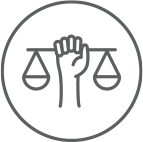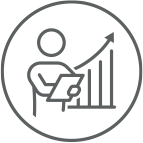
Section B: Management and Process Disclosures
| Sl. No. | Disclosure Questions | P1 | P2 | P3 | P4 | P5 | P6 | P7 | P8 | P9 | |||||||||
|---|---|---|---|---|---|---|---|---|---|---|---|---|---|---|---|---|---|---|---|
Ethical & Transparent
business conduct
 Businesses should
conduct and govern
themselves with
integrity and in
a manner that is
ethical, transparent
and accountable
Businesses should
conduct and govern
themselves with
integrity and in
a manner that is
ethical, transparent
and accountable
|
Sustainable
and safe goods
 Businesses
should provide
goods and
service in a
manner that
is sustainable
and safe
Businesses
should provide
goods and
service in a
manner that
is sustainable
and safe
|
Well-being of
Employees
 Businesses
should
respect and
promote
the well-being
of all
employees,
including
those in their
value chains
Businesses
should
respect and
promote
the well-being
of all
employees,
including
those in their
value chains
|
Interest of
Stakeholders
 Businesses
should
respect the
interests
of and be
responsive
to all its
stakeholders
Businesses
should
respect the
interests
of and be
responsive
to all its
stakeholders
|
Promote Human rights  Businesses
should respect
and promote
human rights
Businesses
should respect
and promote
human rights
|
Protect & Restore
Environment
 Businesses
should respect
and make efforts
to protect and
restore the
environment
Businesses
should respect
and make efforts
to protect and
restore the
environment
|
Public Policy
Advocacy
 Businesses,
when
engaging in
influencing
public and
regulatory
policy, should
do so in a
manner that
is responsible
and
transparent
Businesses,
when
engaging in
influencing
public and
regulatory
policy, should
do so in a
manner that
is responsible
and
transparent
|
Diversity &
Inclusion
 Businesses
should
promote
inclusive
growth and
equitable
development
Businesses
should
promote
inclusive
growth and
equitable
development
|
Value to Consumers  Businesses
should engage
with and provide
value to their
consumers in
a responsible
manner
Businesses
should engage
with and provide
value to their
consumers in
a responsible
manner
|
|||||||||||
| Policy and management processes | |||||||||||||||||||
| 1. | a) Whether your entity’s policy/policies cover each principle and its core elements of the NGRBCs. (Yes/No) | Yes | Yes | Yes | Yes | Yes | Yes | Yes | Yes | Yes | |||||||||
| Yes, the Company has policies which are relevant to NGRBC principles. (See below) | |||||||||||||||||||
| b) Has the policy been approved by the Board? (Yes/No) | Yes | Yes | Yes | Yes | Yes | Yes | Yes | Yes | Yes | ||||||||||
| Yes, all the relevant policies are approved by the Board of Directors | |||||||||||||||||||
| c) Web-link of the Policies, if available | Yes | Yes | Yes | Yes | Yes | Yes | Yes | Yes | Yes | ||||||||||
| Company policies are available on Schaeffler India official website, also some policies & internal documents are available on company’s internal website. https://www.schaeffler.co.in/en/investor-relations/corporate-governance/codes-and-policies/ | |||||||||||||||||||
| 2. | Whether the entity has translated the policy into procedures. (Yes/No) | Yes | Yes | Yes | Yes | Yes | Yes | Yes | Yes | Yes | |||||||||
| Yes, all the policies are translated into procedures. Procedures are available on management handbook on the Company’s internal website. | |||||||||||||||||||
| 3. | Do the enlisted policies extend to your value chain partners? (Yes/No) | Yes | Yes | Yes | Yes | Yes | Yes | Yes | Yes | Yes | |||||||||
| Yes, per CSRM (Category-specific Requirements Matrix), we extend the policies to the value chain partners, like we have Supplier code of conduct (Now, Business partners code of conduct) applicable to suppliers. https://www.schaeffler.co.in/en/company/purchasing-and-supplier-management/ | |||||||||||||||||||
| 4. | Name of the national and international codes/ certifications/labels/standards (e.g. Forest Stewardship Council, Fairtrade, Rainforest Alliance, Trustee) standards (e.g. SA 8000, OHSAS, ISO, BIS) adopted by your entity and mapped to each principle. |
ISO 9001:2015 IATF 16949 ISO/TS 22163:2017 Quality Assurance programme certification |
ISO 9001:2015 IATF 16949 ISO/TS 22163:2017 ISO 14001:2015 ISO 45001:2018 BIS series |
LKSG ILO Convention ISO 45001:2018 |
ISO 9001:2015 IATF 16949 TISAX BIS series |
LKSG ILO Convention ISO 45001:2018 |
ISO 45001:2018 ISO 14001:2015 ISO 50001:2018 EU-EMAS |
BIS Specifications |
LKSG ILO Convention |
ISO 9001:2015 IATF 16949 Quality Assurance programm certification ISO/TS 22163:2017 TISAX BIS series |
|||||||||
|
1Our IT Procedures are compliant with General Data Protection Regulation
(‘GDPR’) and the Digital Personal Data Protection Act, (‘DPDP’) 2023.
1Information security management system (ISMS) is aligned with international standards such as ISO/IEC 27001. |
|||||||||||||||||||
| 5. | Specific commitments, goals and targets set by the entity with defined timelines, if any. | Schaeffler India has developed an ambitious and structured programme with long-term goals to advance our commitment towards sustainability. (Refer page 55) | |||||||||||||||||
| 6. | Performance of the entity against the specific commitments, goals and targets along-with reasons in case the same are not met. | Schaeffler India has the process of monitoring ESG performance to track deviations on time. Schaeffler India conducts regular quarterly reviews of ESG performance with the Top Management and presents the same to the Board of Directors and the suggested changes, if any, are made in the strategy, if required. Also, Monthly reviews are conducted at plants by Plant Managers. Details about progress so far on our targets is available on page 55 in the Annual report. | |||||||||||||||||
| P1 | Businesses should conduct and govern themselves with integrity, and in a manner that is Ethical, Transparent and Accountable. |
|
|||||||||||||||||
| P2 | Businesses should provide goods and services in a manner that is sustainable and safe |
|
|||||||||||||||||
| P3 | Businesses should respect and promote the well-being of all employees, including those in their value chains. |
|
|||||||||||||||||
| P4 | Businesses should respect the interests of and be responsive to all its stakeholders. |
|
|||||||||||||||||
| P5 | Businesses should respect and promote human rights |
|
|||||||||||||||||
| P6 | Businesses should respect and make efforts to protect and restore the environment. |
|
|||||||||||||||||
| P7 | Businesses, when engaging in influencing public and regulatory policy, should do so in a manner that is responsible and transparent. |
|
|||||||||||||||||
| P8 | Businesses should promote inclusive growth and equitable development. |
|
|||||||||||||||||
| P9 | Businesses should engage with and provide value to their consumers in a responsible manner. |
|
|||||||||||||||||
| (All are internal policies available on company intranet page.) | |||||||||||||||||||
| Governance, leadership and oversight | |||||||||||||||||||
| 7. |
|
||||||||||||||||||
| 8. |
|
||||||||||||||||||
| 9. |
|
||||||||||||||||||
10. Details of Review of NGRBCs by the Company:
| Subject for review | Indicate whether review was undertaken by Director/Committee of the Board/Any other Committee | ||||||||
|---|---|---|---|---|---|---|---|---|---|
| P1 | P2 | P3 | P4 | P5 | P6 | P7 | P8 | P9 | |
| Performance against above policies and follow up action Compliance with statutory requirements of relevance to the principles, and, rectification of any non-compliances | Yes, Done by Executive management, relevant committee & Board | ||||||||
| Subject for review | Frequency | ||||||||
|---|---|---|---|---|---|---|---|---|---|
| P1 | P2 | P3 | P4 | P5 | P6 | P7 | P8 | P9 | |
| Performance against above policies and follow up action Compliance with statutory requirements of relevance to the principles, and, rectification of any non-compliances | Periodic reviews by relevant executive management for six pillars & Quarterly by Relevant committee & Board | ||||||||
11. Has the entity carried out independent assessment/evaluation of the working of its policies by an external agency? (Yes/No). If yes, provide name of the agency.
| Yes, an assurance engagement was carried out by BDO AG to provide assurance about design, implementation and operating effectiveness of Compliance Management System on topics anti corruption, anti-trust and prevention of economic crime. During the EHS audits, as part of the requirements of ISO standards, EHS policy is assessed/evaluated and suitable review is undertaken if required. Independent external agencies Ms. EMAS and Ms. Intechnica are conducting our EHS & energy management systems audits. Also, we have robust internal audit process which carry out a detailed examination of policies & procedures and regulatory requirements. As a part of process, report on the status of compliance is submitted to Board on a regular basis. To comply with best practices and mitigate risks, policies are reviewed and revised periodically by various business leaders, and then approved by the management/Board. Policy review is also part of ISO certification process which is done at HQ level. |
12. If answer to question (1) above is “No” i.e. not all Principles are covered by a policy, reasons to be stated:
| The entity does not consider the Principles material to its business (Yes/No) | Answer to question (1) above is “Yes”, hence this question is Not Applicable | ||||||||
|---|---|---|---|---|---|---|---|---|---|
| The entity is not at a stage where it is in a position to formulate and implement the policies on specified principles (Yes/No) | |||||||||
| The entity does not have the financial or/human and technical resources available for the task (Yes/No) | |||||||||
| It is planned to be done in the next financial year (Yes/No) | |||||||||
| Any other reason (please specify) | |||||||||